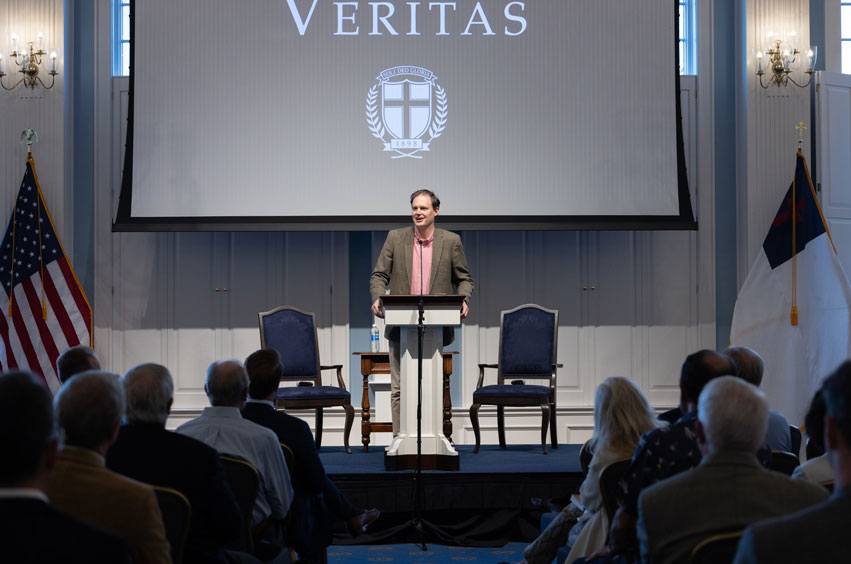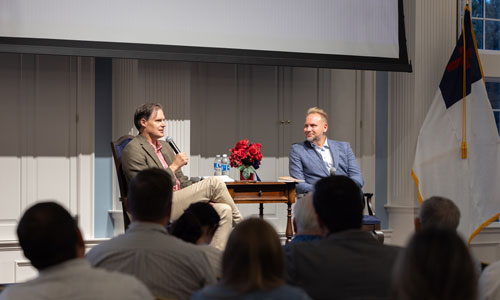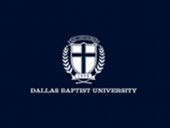DBU Hosts Dr. Peter Williams for Veritas Lecture Series

On the evening of September 24, Dallas Baptist University was honored to welcome Dr. Peter Williams as the speaker for the latest Veritas lecture series hosted by the Institute for Global Engagement. The event began with a brief introduction from DBU President Dr. Adam C. Wright and the Executive Director for the Institute for Global Engagement, Jonathan Fechner.
Dr. Williams was invited to speak about his book, The Surprising Genius of Jesus , which focuses on the brilliance with which Jesus teaches his followers, emphasizing the detail and thoughtfulness employed in the parable of the prodigal son. He shared how "Jesus knows how to tell the perfect story." This is a declaration of the powerful nature of Christ, that while fully man, He was also fully God.
Dr. Willams began his lecture by reading the Parable of the Prodigal Son found in Luke 15:11-32. He broke down the parable and explained how it was "emotionally brilliant on a psychological level." He notes how the story is focused on the relationship between the father and his sons and thus leaves out small bits of contextual information. "A really good storyteller leaves loose ends in his story—it forces you to think and meditate on it. This way, you will remember certain details in a story that is left out far better, for you must work it out on your own," mused Williams. While telling the parable, he also discussed how Jesus continuously employs contrasting emotions between the sons, father, and servant. This causes us to emotionally invest in the story and empathize with the brothers and the father.
He also brought attention to the fact that while the older son in the parable may have been much closer to their father physically, as he lived and worked with him, the estranged son was much closer emotionally. Upon returning home, the prodigal son cried out for his father's forgiveness and was joyfully received while his brother maintained a distance. When the younger son asked his father for the inheritance at the beginning of the parable, the older son received his share as well, which was larger than his runaway brother's portion, yet the brother expressed no gratitude. Dr. Williams put a necessary emphasis on the older son's actions, as it is just as pertinent to the parable as the younger son's journey.
Dr. Williams discussed just "how right it could have gone," had the older brother expressed gratitude for this surprise. Yet, he allowed anger and bitterness to build up like a disease, which he lashed out at his father at the end of the story. He asserted that the parable had to be told the way Jesus chose to tell it, which was why it was genius.
To tie up the discussion about the illustration, Dr. Williams brought up the brilliant type and shadow found in this parable. In Genesis, we find the story of two brothers, Jacob and Esau. The story involves a birthright and a sort of sibling rivalry reminiscent of the parable, according to Dr. Williams, which furthers the intellectual might of the allegory.
To further his point about Jesus' brilliance, Dr. Williams also touched on a few of Jesus' famous "one-liners," for instance, "Be as wise as serpents and harmless as doves." Dr. Williams expressed his amazement at the cleverness of the quips, saying he "cannot find their match in Shakespeare." The reason for this, said Dr. Williams, is that so many of Shakespeare's sayings rely on the context of their time, which is true for others as well. As another example, Dr. Williams referred to Winston Churchill, who once said, "We shall fight on the beaches." This is lovely, but for that geographic context alone, according to Dr. Williams. However, Jesus' sayings were so well worded, so perfectly said, that they apply to any time or place.

The evening came to a close with a heartwarming Q&A session led by Senior Fellow for Christian Origins at the IGE, Dr. Jeremiah Johnston, about Dr. Williams's childhood and his calling to write The Surprising Genius of Jesus, in which Dr. Williams also shared the touching testimony of his father. He also shared about his journey to Tyndale House, a research institute in Cambridge dedicated to studying the Bible on a deeper level.
Dr. Peter J. Williams is the Principal and CEO of Tyndale House, Cambridge. He was educated at the University of Cambridge, where he received his M.A., M.Phil., and Ph.D. in the study of ancient languages related to the Bible. After his Ph.D., he was on staff in the Faculty of Divinity at the University of Cambridge (1997-1998) and thereafter taught Hebrew and Old Testament as an Affiliated Lecturer in Hebrew and Aramaic at the University of Cambridge and Research Fellow in Old Testament at Tyndale House, Cambridge (1998-2003).
From 2003 to 2007, he was on the faculty of the University of Aberdeen, Scotland, where he became a Senior Lecturer in New Testament and Deputy Head of the School of Divinity, History, and Philosophy. Since 2007, he has been leading Tyndale House. Dr. Williams is also an Affiliated Lecturer in the Faculty of Divinity at the University of Cambridge, Chair of the International Greek New Testament Project, and a member of the Translation Oversight Committee of the English Standard Version of the Bible. He assisted Dr. Dirk Jongkind in Tyndale House's production of a major edition of the Greek New Testament and is the author of Can We Trust the Gospels? (Crossway, 2018) and The Surprising Genius of Jesus (Crossway, 2023).
The Institute for Global Engagement is a Christian, non-sectarian think tank dedicated to addressing issues in the public square with biblical distinctiveness. The mission of the IGE is to be a moral and spiritual catalyst for renewal in our culture. Founded in 2015, the IGE values the biblical narrative, thoughtful consideration, and gracious civility.
Layla Ned writes for University Communications at Dallas Baptist University.








